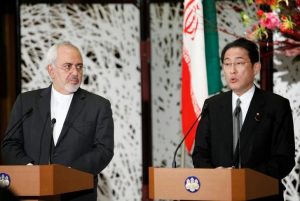By Kaori Kaneko and Jane Chung
TOKYO/SEOUL, June 27 (Reuters) – Japan and South Korea, two major buyers of Iranian oil, are in talks with the U.S. government in a bid to avoid adverse impacts from Washington’s reimposition of sanctions aimed at cutting Iran out of international markets.
The United States is demanding countries cut all imports of Iranian oil from November, a senior State Department official said on Tuesday as the Trump administration ramps up pressure on allies to cut off funding to Iran.
Both countries won waivers that allowed them to buy limited amounts of oil from Iran during the previous round of sanctions that ended in 2016, but Washington has this time adopted a more aggressive stance.

Japan’s Chief Cabinet Secretary Yoshihide Suga told a news conference on Wednesday that Japan and the United States were in talks about the sanctions on Iran, but declined to reveal details.
“Japan and the U.S. are in talks now on re-application of U.S. sanctions against Iran, and I decline to reveal the details of the discussions,” Suga said.
“We are watching carefully the impact that the U.S. measure would cause, and we would like to negotiate with countries involved including the United States so as not to have an adverse impact on Japanese firms,” he added.
In South Korea, an Energy Ministry official who declined to be named said the government would keep negotiating with the United States in order to get an exemption from the U.S. sanctions.
“We are in the same position as Japan. We are in talks with the United States and will keep negotiating to get an exemption,” said the official.
MAJOR CUSTOMERS
While oil supplies were not mentioned by either official, the threat of losing Iranian supplies looms over both countries, who import virtually all of their crude needs.
Iran is the third-largest exporter among the Organization of the Petroleum Exporting Countries (OPEC), and Japan and South Korea are two of its major customers along with China and India.
Buyers from Japan, South Korea and India have already started to dial back purchases from Iran.
Oil prices on Wednesday did not react strongly as traders had anticipated Washington’s move and largely priced in the hard-line stance.
“This more aggressive tack from the Trump administration likely means Japan and South Korea will move more quickly to zero-out their imports (from Iran) too. On the other hand, China, India, and Turkey will likely balk at significant cuts to imports by November,” political risk consultancy Eurasia Group said in a note.

Iranian oil shipments to Japan and South Korea rose after sanctions against Tehran were lifted from 2016, but they peaked at 700,000 barrels per day (bpd) in late 2016 and have fallen to around 200,000 bpd, shipping data in Thomson Reuters Eikon showed.
Suga said the government was also in talks with Tehran. Japan’s Prime Minister Shinzo Abe is considering going to Iran in July for talks with President Hassan Rouhani, Kyodo News reported on June 21, citing unidentified Japanese government sources.
(Reporting by Kaori Kaneko and Osamu Tsukimori in TOKYO and Jane Chung in SEOUL; Writing by Henning Gloystein; Editing by Christian Schmollinger and Richard Pullin)

